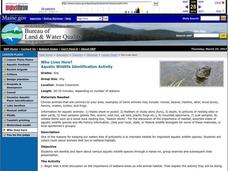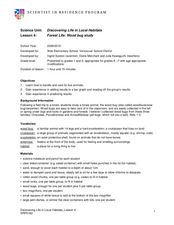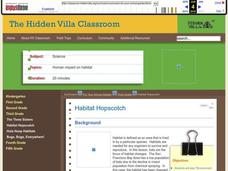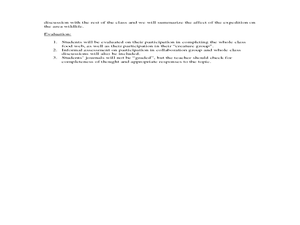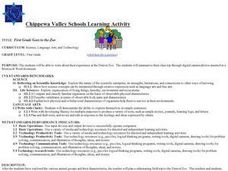Curated OER
Habitat is Home
Students complete a picture to show things found in their homes. In this habitat lesson plan, students discuss and make a class picture of an animal habitat and its four basic needs. Students sing a song. Students create their own...
Curated OER
Who Lives Here?
Young scholars identify various aquatic wildlife species. In this biology lesson students collect clues about animals that live in wetland habitats. Young scholars rotate through several stations displaying particular animal species to...
Curated OER
Habitat Assessment
Third graders demonstrate the effects of varying environmental components on plants and animals: chemical, physical and biological characteristics of a habitat. They find chemical, physical and biological characteristics of the lake at...
American Museum of Natural History
Cuban Wildlife Matching Game
Young biologists match Cuban wildlife to their ecosystems by dragging images of the creatures to either a forest, coral reef, cave, or wetland habitat.
Curated OER
Don't Call Me A Pig
First graders explore wildlife and habitats in the Arizona desert. Throughout a classroom discussion, 1st graders observe pictures of the desert and animals that live there. As they go on a nature walk around the school, students...
Curated OER
Forest Life- Wood Bug Study
Examine wood bugs and their habitat. Learners gather wood bugs and examine their bodies. Then discuss their body parts and how they help them survive. They also predict where they think wood bugs live to then graph the class results.
Curated OER
Rainforest Rescue
Students explore threats to diversity in the Central African rainforest. They use a guided website to research animals that are threatened with extinction, examine human uses of the rainforest and think about what they can do to help...
American Museum of Natural History
Ocean Creature Feature
From coloring to hard protective shells, ocean creatures have adaptation features that help them survive. An eight-question online quiz highlights different ocean animals and their unique characteristics. The resource then offers pop-up...
Sea World
Shark!
Is that a shark? Here's a 10-lesson unit that will have learners expanding their definition of what a shark actually is as they examine different features, habitats, and diets. They explore endangered species, using information cards...
Curated OER
Who Takes Care of the Maya Forest Corridor?
First graders explore the work of conservationists and how they make sure animals and people are safe in their habitats. They identify the rules, laws, jobs, and people who help them feel safe and keep them healthy. Students explore who...
Curated OER
Exploring Habitats
Third graders go on a mission to research three different habitats on the campus of Manchester College so that they can be part of a resuce effort. They work in groups and each group starts at a different habitat. Group one starts at...
Curated OER
Pond Habitats
Students define what a pond habitat is and explain what animals live in this habitat. They discuss what can harm or destroy a pond habitat. They create a poster of what could harm a pond habitat including illustrations and sentences. ...
Curated OER
Habitat Hopscotch
Third graders explore animal characteristics by participating in a bat environment game. In this natural habitat lesson, 3rd graders identify the physical anatomy of a bat and discuss their eating and sleeping habits. Students conduct a...
Curated OER
Habitats Worksheet
In this environment worksheet, students examine different types of animals that interact with the school environment and students write about some of the possible consequences for the animals.
Curated OER
Animals and the Food Webs that Love Them
Learners study the animals that Lewis and Clark would have encountered. In this animals lesson students study the food web and how human populations have affected them.
Curated OER
Salt Marsh Plants and Animals
In this salt march plant and animals worksheet, students read descriptions of animals, then match each to its picture. Students then read about tidal animals and choose which animals in picture are most likely to be in a salt march at...
Curated OER
Habitats and Components School Forest Lesson Plan
Second graders go on nature scavenger hunts. In this nature scavenger hunt lesson, 2nd graders explore the natural habitat of their school grounds and make observations regarding the objects and animals they find in the air, on the...
Curated OER
Teeth and Eating
Students explore animal diets and teeth. In this animal science lesson, students view photos of animals and their teeth. Students identify the type of diet the animal has based on the teeth. Students are introduced to the terms...
Curated OER
Animal Bingo
Students discuss facts about animal habitats. In this animal instructional activity, students recall animal facts about habitats in an animal Bingo game. Teacher pieces and cards are already created and ready to print out.
Curated OER
Rainfall Mapping
Students explore rainfall and habitats. In this rainfall lesson, students explore the relationships among rainfall, vegetation, and animal habitats. Resources are provided.
Curated OER
A House for Me- Ocean Environments
Learners explore ocean environments. For this ocean environment lesson, students identify the things ocean animals need for survival. Learners use KWL charts and search the Internet collecting information about ocean habitats. Students...
Curated OER
Creating a Pond Habitat
Students create a pond habitat inside and outside their classroom. In this pond lesson plan, students create a habitat with animals, water, and plants in order to create a proper pond habitat.
Curated OER
First Grade Goes to the Zoo
First graders summarize their trip to the zoo. In this summarizing lesson plan, 1st graders will study animals that they may see at the zoo including their characteristics and habitats. Once the trip is done, they create a word document...
Curated OER
The Living Environment
Students use a spoon, clothespin, scissors, and toothpicks to simulate how animals get food in their environment. In this environment lesson plan, students learn about the adaptations animals make in order to survive.



